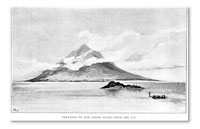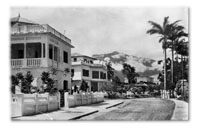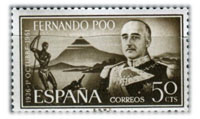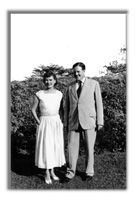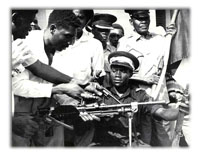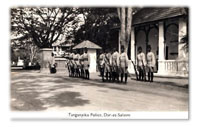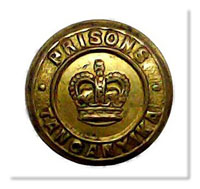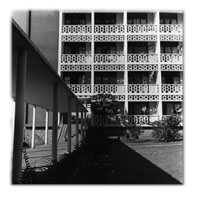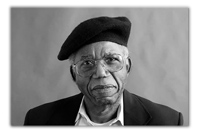In 1985 Brian Lapping wrote End of Empire, a masterful account based on his TV series starting with India, The Jewel in the Crown, the first to be dislodged, moving through the Middle East, finally to Africa, the continent where many of OSPA's of remaining members served. That was the year I retired after spending 20 years at IDS where FCO had held a conference about what should be done with the remaining pieces of empire excluding the sensitive territories of Gibraltar and Hong Kong. Our government is still struggling with this rump which now includes several tax havens, and of course, the Falklands and Gib. The Colonial Office (CO) in its hey-day employed some 4000 staff, never mind countless overseas officers. A new large building being planned was aborted and it lingered on in rented accommodation in Church House, Westminster, and as the Empire shrank, finally finished up in a room in the Commonwealth Office, which itself was merged with the FO to become what was mischievously called by detractors, the "Common and Foreignwealth Office", but which we now all know respectfully as the FCO.
The German History Museum is currently hosting a special exhibition about its colonial past. Back in the '40s on the "Devonshire" course we probationary administrators, mostly public school and Oxbridge, learned that the UK headed up the international colonial admin league table of France, Belgium, Portugal, Spain, Germany, US and the empires of Rome, both ancient and modern.
How will the British colonial record be remembered?
At its peak in the 1870s the achievements of the British Empire were once encapsulated in our Imperial Institute intended as a permanent Empire museum. But after WW2 in 1958 this morphed into the Commonwealth Institute and Imperial College, and as the role of the Commonwealth declined so did that Institute, which closed down in 2002. Its unusual copper roof donated by the Northern Rhodesia Chamber of Mines always leaked, threatening the future of the building. Its contents were then transferred to the Museum of the British Empire and Commonwealth in Bristol, which itself closed in 2009, and some of the contents were then passed to the Bristol City Museum. The remaining assets were liquidated and passed to the Commonwealth Education Trust, a charity established in 2007 to advance education in the Commonwealth.
How then shall we be remembered? It will not be by this sorry institutional saga. What is needed is another Gibbon, Britain's finest ever historian, to match his History of the Rise and Fall of the Roman Empire, a monumental task. We need someone who can take better distance from Elkins' murky account of the Mau Mau rebellion, who will not confuse British politics with its administration, turning us into the whipping boys. Politicians have concealed colonial records at Kew and they have also had some destroyed, but a rich seam remains. The anticipatory Colonial Records project at Rhodes House of all places was set up 60 years ago as our exodus gathered momentum. Many of us sent our papers there to be perused by future scholars. OSPA has worked hard to place on the record and preserve a faithful account of our remarkable contribution to development and independence.
The Romans were ill-prepared for their sudden exodus from Empire. Likewise we have received little notice to make ready for unexpected departure - Brexit. For many, especially because of our preoccupation with WW2, our withdrawal from Empire seemed hasty and ill-prepared. Many of my colleagues were blinkered and ignored the winds of change, and spoke of the need for another 25 years as they grasped their golden handshake.
Our departure from Africa was a major, well-accomplished exercise. Early (secretive) thinking about independence took place at a Colonial Conference held in the late '30s when Indian independence was already imminent.
It is impossible to predict what would have happened had Churchill won the 1945 election, but Labour was well prepared, and Indian independence was successfully erected on the 400 year foundations of the British Raj and the ICS. This very separate and somewhat exclusive experience inevitably impacted on the colonies. Thus in Uganda we adopted both the Indian and Criminal and Codes as the basis for the codification of our legal system. District Officers were modelled on Indian Collectors. Both were concerned with tax collection.
The first formal notice of Labour's plans came in a widely promulgated 1948 despatch from the Secretary of State for the Colonies, Arthur Creech Jones, in a despatch containing policies rehearsed in Labour's Fabian Colonial Research Bureau. Rather unusually a member of that bureau also occupied the Africa desk at the Colonial Office, a high flyer and seen as the architect of African independence. At the time some of the problems seemed insurmountable. In East and Central Africa there were white settlers with similar ambitions to those in South Africa. Our man at the Africa desk, who had seen war service posted at the tender age of 32, as the Lieutenant- Governor of Malta under siege, devised a federal solution for Central Africa which failed. The transfer of power to African politicians began in Gold Coast in 1958, a model that would inspire others to follow, the process ending up finally with a formal constitutional conference at Lancaster House in London. Not all loose ends were always successfully tied up; Rhodesian land ownership for example.
Understandably the architect for the demolition of our African empire was not universally popular. Officials on the spot often said much more time was needed to prepare for independence despite the start of crash education, development, and localization programmes. The Westminster democratic constitutional model powered events with African politicians at the helm subordinating traditional authority systems.
The Africa "architect", Sir Andrew Cohen, was again translated from the Colonial Office, only this time to govern Uganda, where as a protectorate, indirect rule was firmly entrenched rather than Westminster democracy. As a result, his term of office was marred by the deportation of the Kabaka of Buganda, who had been recognized in a solemn agreement made with Queen Victoria in 1900. Indeed Churchill teased him by asking him whether he had heard of the divine right of kings, which curiously arises today over sovereignty and Brexit, with our PM now being compared to Henry VIII.
Sir Andrew Cohen (1909-1968) joined the CO in 1933 when the British Empire of tropical Africa was expected to last for ever. After a scholarship and first class honours at Trinity College Cambridge he became a home civil servant, African governor, diplomat at the UN, and finally the first Permanent Secretary of Labour's new Ministry of Overseas Development (referred to as ODM to avoid confusion with the Ministry of Defence) which became responsible for British overseas aid with a crucial part in helping establish newly independent territories. His field experience was invaluable in this. His biographer, who never finished the task, described him as "the first to foresee the coming of African independence at the end of Hitler's war, and as most urgent in laying the necessary foundations for it. ...the first proconsul for African nationality in the common interest of Britain and Africa his personality was represented by an intensely individual force of mind, a towering physical presence, and volcanic energy".
The new dynamic leaders at ODM (Andrew Cohen and Barbara Castle) became known mischievously as "the Elephant and Castle".
At Cambridge because of his towering intellect, he was recruited as an Apostle and accordingly labelled a Russian agent by the notorious Peter Wright in his sensational and inaccurate book "Spy Catcher", an absurd libel which sadly Cohen could not refute from the dead. He took no part in Jewish corporate life, finding Jewish communalism as objectionable as discriminatory Zionism. His sister, Ruth, became Mistress of Girton College, Cambridge. He reminded me of my wonderful college principal, a towering Jewish intellectual who also died in his prime. By 1947 Cohen had risen to become head of the African division in the CO where he was one of the few to realise that there had to be a change from indirect rule via African chiefs to modern systems of representative government making use of educated African officials and elected leaders. The beginning was to be with changes in local government, reflected in the 1948 despatch, leading to a transformation to the nation state.
Cohen believed that after Creech Jones fell from office in 1951 he was exiled to Uganda where a Governor's boots would cool his radical heels. He was renowned for his awkward loathing of ceremony. He first came on tour to the district where I had just been made a rather young District Commissioner, and we clicked, as I was a rebel, too. We revised the old Bunyoro Agreement and signed a new one in preparation for things to come. I became a disciple to the Apostle. Later our young Native Authority Clerk who had made his way through Uganda's Byzantine constitutional changes all the way from Bunyoro in the early 50s to Parliament to become Obote's deputy PM at Independence some 20 years later, asked me to stay on as PS Education. I sat down with Jo Zake, an old friend, and now Obote's new Minister of Education, and his first words were that with the departure of so many expats we had to double the numbers in tertiary education. When I asked where would we get the teachers, he replied, "I've rung Andrew Cohen in London and he says he will arrange this". He did, and so did we.
When I returned home in 1965, Cohen summoned me to the ODM and said he had a job for me at IDS. There must be many others whose lives were influenced by this remarkable man with a prophetic vision of Africa's future architecture.
Postscript
Although our Empire has ended, curiously its 1917 Order of Chivalry still lingers on and, strangely, with awards mostly to athletes and actors.
